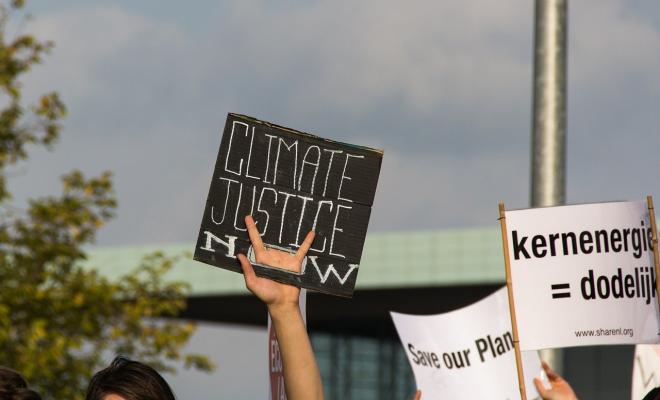03 Dec 2025
In 2020, a fresh wave of global protests, triggered by the murder of George Floyd and led by Black Lives Matters helped restart conversations about systemic racism across institutions and movements – including the environment movement.
A big part of this conversation must include and acknowledge the historic role that environmentalism and conservation has played in racism and colonialism. Many foundational environmentalists held racist and white supremacist beliefs that resulted in causing significant and ongoing harm to many cultures across the globe today. The mainstream environment movement today, including organisations like Friends of the Earth, is still overwhelming white and middle class. Many of these organisations were forged in racist societies, often trying to create change by appealing to and legitimising racist structures.
It's important to also acknowledge that we’re seeing a rise in far-right extremism and fascism. The use of climate narratives to further oppress marginalised groups like refugees is chilling. Far-right extremists are blaming migrants and refugees for everything from climate breakdown to the cost-of-living crisis. This is an intentional tactic to drive division in our society and it’s simply not true. Not only are these narratives wrong, but they distract from, and delay, meaningful action on the ecological crisis and climate change. Now more than ever it's important to show allyship and solidarity.
Blackwater Valley Friends of the Earth organised a family picnic and games afternoon for asylum seekers living in a hotel in the community for #RefugeeWeek in 2024. The group got posters translated into Arabic, Persian and Kurdish and put them up at the temporary accommodation.
Over 50 people from the hotel joined and one member said: “there were lots of children taking part in the games and enjoying the picnic. Sport really is a universal language, and it was wonderful to see children with very little English getting stuck into football, rounders and volleyball.” The group had lots of fun and many wonderful conversations with people from a wide range of countries including Joran, Georgia, Algeria, Albania, Eritrea, Syria, Sudan and Iraqi Kurds.
Spotlight on Blackwater Valley Friends of the Earth
As a member of the movement we acknowledge our part, and that we have a long way to go until we've addressed the legacy of racism within Friends of the Earth. We’re committed to learning how the legacies and current manifestations of racism affect people both at home and abroad, and how our response to the climate crisis may impact communities differently.
We must find fair and equitable solutions to the climate and ecological crises that make the world a better place for those who are hardest hit. The environmental movement, including us, have been guilty of leaving the most affected out of conversations that involve them. We must make anti-racism central to our network of groups so that we create a more diverse and representative movement.
Why climate breakdown is a race issue
The climate crisis is a racist crisis. Industrialised countries, the majority of which are northern white countries, make up a combined 20% of the global population but are responsible for around 80% of emissions ever emitted. It's primarily countries in the global south like Mozambique, Pakistan, Thailand and Haiti who are feeling the impacts of climate breakdown and who will continue to face the worst of its effects.
We’re not saying that climate change affects only Black people. However, it is communities in the Global South that bear the brunt of the consequences of climate change, whether physical – floods, desertification, increased water scarcity and tornadoes – or political: conflict and racist borders.
Alexandra Wanjiku Kelbert, Black Lives Matter UK
Injustice is at the root of the climate crisis, with multinational corporations and rich, white countries like the US, UK and Australia reaping the benefits of burning carbon and exploiting resources, leaving low-income communities to suffer the consequences.
Oppressive systems such as white supremacy, colonialism and the systematic dehumanisation of People of Colour and Indigenous Peoples have facilitated this extractivism over the centuries and allowed for the continued destruction of the environment. Climate and environmental breakdown cannot be separated out from other struggles for equality and racial justice.
What's environmental racism?
Environmental racism is a term used to describe discriminatory environmental policies and practices that negatively impact Black, brown and minority ethnic communities more than white communities.
Examples of environmental racism include:
- Friends of the Earth's former legal intern Conso Enobakhare describes how "Indigenous, Black and brown communities around the world are more vulnerable to air pollution because of racism that sees them commonly located near belching factories, smog-filled highways, exploding pipelines and other extractive infrastructure".
- Indigenous communities being systematically displaced in the name of conservation.
- Corporations paying militia to repress and even murder environmental protest by Black and brown people (for example, see Shells abuses in Nigeria and the murder of Berta Cáceres, and the murders of Bruno Pereira and Dom Phillips).
- The increase in climate refugees and climate related displacement. Millions of people are being displaced by climate disasters.
- Black and brown people in the UK being twice as likely to live in a neighbourhood with minimal access to green space.
- Blaming countries in the Global South for the "overpopulation myth". Overpopulation is not an environmental issue – there are sufficient resources such as food to support the population. It’s the distribution of resources, which favours rich countries and a handful of corporations, that causes environmental and climate breakdown.
Putting justice at the heart of our work
People of colour have pioneered climate activism and resistance around the world, they're often left out of spaces where climate policies and agreements are made. Meanwhile, the industrialised north continues to benefit from the causes of climate breakdown and closes its borders to climate refugees despite contributing most to the cause of their displacement.
We're also seeing a rise in far-right extremism and fascism, such as the violent riots currently taking place across the UK. The use of climate narratives to further oppress marginalised groups like refugees is chilling. People are blaming migrants and refugees for everything from climate breakdown to the cost-of-living crisis. This is an intentional tactic to drive division in our society and it’s simply not true.
Not only are these narratives wrong, but they distract from, and delay, meaningful action on climate change, access to green space and clean air, exposure to pollution and waste. They further entrench inequality and oppression of peoples in the Global South, and ignore the worst consequences of the climate crisis around the world today.
We need racial justice to be at the heart of the climate and environmental movement. That means acknowledging the uncomfortable truth that the UK's environmental movement remains overwhelmingly white and middle-class. It means transforming the way in which we campaign. Listening more deeply to underrepresented voices, being honest about where we’ve got things wrong in the past and humble about how much we still need to learn.
What you can do
"The beauty of anti-racism is that you don’t have to pretend to be free of racism to be anti-racist. Anti-racism is the commitment to fight racism wherever you find it, including in yourself."
Ijeoma Oluo, Author
Working together with a diverse range of people will help us build better solutions for a better world. As an organisation, with our supporters and with the wider network, we need to call out racism wherever we see it, and together build a more inclusive and just environmental movement.
Personal learning: There’s a lot we can do to understand how racism impacts on our fight for justice, within and beyond the climate and environmental movements. Awareness is crucial and we need to educate ourselves. Why not embark on some solo learning by exploring our set of resources on how climate and race intersect?
Learn with your group/ family/ community: Listen, learn and discuss with your community, whoever that may be. Becoming truly anti-racist means taking action that challenges racism, however this shows up. Start conversations, challenge oppressive behaviour, host reading groups, add anti-racism work as an agenda point in your next group meeting, share resources… the list goes on.
Be a good ally: Don’t be afraid to start exploring what being a good ally could look like for you and for your community. We’re all learning and on a journey. We all have different experiences and will be coming to this work from different places. Enter with an inquisitive and open mind and work towards making it central to your campaigning on climate and the environment. Because if we’re going to save the planet, we’ll only do so through the liberation and emancipation of everyone who lives on it.
Toqueer volunteers for Footsteps Interfaith Group and Birmingham Friends of the Earth and is committed to ensuring green spaces are inclusive and accessible to people of all backgrounds and accessibility needs. Read about his green adventures, volunteering experiences and how he’s breaking down barriers to make the environment movement more inclusive. Listen to our podcast where Toqueer shares his experience as part of an interfaith group.
Spotlight on Toqueer, Birmingham Friends of the Earth.
How to be a good ally
Privilege bingo! If you’re white, a cis-male (meaning you present and identify as male), heterosexual, and don’t experience any forms of disability, you’ve hit privilege bingo! That means that, in the UK, our society - and its various structures – works best for you.
While it might not feel like that, this is because those of us in positions of privilege are so used to how we experience things that we don’t recognise our experience of the world is not universal. This is well explained by Reni Eddo Lodge in her book Why I’m Not Talking to White People who comes to learn how our structures make things so much harder for wheelchair users and disabled people when she has to commute carrying her bicycle.
Right now, a lot of people across Britain, particularly people of colour and Muslims, are feeling the effects and threats of violence and intimidation from racist far-right riots. Hearing messages of support, hope and welcome from their fellow community members like you can help them feel like they belong and are valued by the community. As a group, you could send them a letter of solidarity and support. Use this template letter to offer your support and allyship.
Being privileged means being in a position of power and using that power to challenge the structures of inequality around us, and also to transfer the power you have. This is being a good ally. Here are 5 tips on how you can use your privilege to be a good ally:
1. Listen
As a person in a position of privilege it’s likely you already take up more space than those from marginalised communities. Listening, and giving up space to others, is a way in which we can give a bit of space back. We are surrounded by images and depictions of white, middle class, society – the mainstream. By listening we give back space but also learn about people who are underrepresented in our culture.
2. Be prepared to be challenged
It may be that reading this list feels challenging - but you’re still here. That’s what we mean by being prepared to be challenged. Learning about power and privilege is not always comfortable. It can bring up a lot of feelings including guilt and defensiveness – but we need to do our best to overcome these feelings – because if we don’t, we won’t change, and we won’t create a more equal society.
3. Ask questions
From fear of being rude we often hold back from asking someone about their experience, but without asking (and then listening!) we won’t learn! Asking questions, with humility and being mindful of the feelings of others, allows them to speak about their own experience and helps challenge incorrect assumptions. When asking people about their experiences, respect their boundaries if they don't have the time, energy or desire to respond.
4. Intervene
In addition to being challenged, sometimes we need to challenge others. If you see behaviour that contributes to oppression and you feel safe to do so, confront it. While this might be challenging for us, it takes the burden of responsibility for responding to oppression away from the person experiencing the oppression.
Read our guidance on attending counter-protests in response to far right riots.
5. Educate yourself
Finally, take responsibility to learn about oppression so that you can become a stronger ally. While asking some questions can be important to learn about a person’s personal experience, it is not the duty of oppressed people to teach us about oppression - we need to do that for ourselves. To help you get started we've put together a reading list on Climate Justice and Race.
Key terms and definitions
Anti-racism: “supporting anti-racist policies, and ideas through actions” – Ibram X Kendi. Anti-racism challenges systemic racism, prejudices and oppression of people based on race, through policies, campaigns, actions and ways of thinking. While it can feel well-intentioned to “not be racist” or “not to see racism”, this isn’t the same as being anti-racist as it doesn’t challenge systemic oppression and racism. It unintentionally (or intentionally) leads to the erasure of the lived experiences of people of colour, perpetuating racism. These kind of comments are also known as “microaggressions”.
Anti-oppression: “oppression is the use of power to disempower, marginalise, silence or otherwise subordinate one social group or category, often in order to further empower and/or privilege the oppressor” - The Anti-oppression Network. Anti-oppression counters oppressive power structures within society to create a fairer, equitable society.
Extractivism: exploitation of resources on a large scale and typically without giving back or replacing what has been taken.
Global South: defined along geographical boundaries and access to money and resources. Countries in the Global South are those with limited access to money, technology and resources. Therefore, they face extreme poverty and are more vulnerable to the impacts of climate change, such as sea level rise, flooding and drought. For example, countries found in the global south in the Latin American and African continents, Pacific Island states and South Asian continent found in the southern hemisphere.
Global North: countries in the Global North, traditionally found in the northern hemisphere (however includes countries such as Australia), and are the richest countries with disproportionately high access to wealth, money and resources. These countries have benefitted from their own resource extraction as well as extraction of resources from countries in the Global South.
Allyship: active support for the rights of a minority or marginalised groups without being a member of it. For example, you could be a middle-class white woman and campaign for indigenous rights in Brazil, or donate to a local Black Lives Matter branch.
Solidarity: acting together around a common goal. For example, a union, local climate group or a human rights group taking an action to stop indigenous land being stolen by a foreign company.
Privilege: an advantage that a group of people has, which they have inherited because of their position in society, their ancestry, their gender, race, health, access to wealth and so on. For example, someone born into an upper-class family has access to all kinds of resources, from education to access to private healthcare, that someone born in the working class doesn’t have. Or, on average a man walking down the street at night doesn’t have the same fears that a woman has due to gender-based violence.
White privilege: the privileges that benefit white people over non-white people. For example, white privilege can look like the mass representation of white people in everyday media such as the news, to feeling safe around the police.




